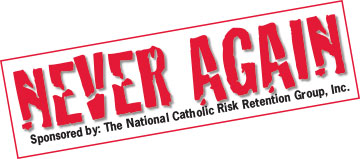
By Michael J. Bemi
In this very first “Never Again” Series article, I hope to clearly and simply answer a number of questions surrounding a critically important task in the church, but one that’s all too frequently underutilized — or worse yet, totally ignored. Namely, I’m talking about risk control.
What is risk control, exactly?
Risk control is a risk management tool that is comprised by two subset elements:
1) Loss prevention — in which we employ policies, procedures, protocols, maintenance programs, training programs and certain devices to actually prevent losses and their attendant damage from ever occurring.
2) Loss control — in which we use these same mechanisms to mitigate the severity of damage from losses we simply could not prevent.
Can risk control really be ministry?
1 Corinthians, Chapter 12 (New International Version) identifies “gifts of administration” as a gift that God has designated people in the Church to have.
While it’s obvious that administration undertaken as risk control isn’t liturgical and doesn’t include a pastoral aspect, it’s equally clear that not nearly as much pastoral ministry will take place in any congregation where the church has burned down, or a major embezzlement has occurred, or a shocking sexual misconduct offense has taken place, or a person has fallen on icy steps leaving church after services, leading to permanent paralysis or death.
Attending to the prevention and resolution of these matters can involve the same level of care, commitment, dedication and hard work as that expended by a youth minister, music director, teacher or principal in a church school, etc. So, at the risk of inadvertently offending someone, I’ll say yes: Risk control can be pursued as a ministry.
Isn’t risk control complex and expensive?
Risk control can be both complex and expensive; but seldom so when considered in a church operations and activities context.
Generally speaking, with very few exceptions (hospitals or skilled nursing facilities, for example), the church doesn’t undertake operations and activities that produce the type of exposure to loss demanding significant outlays for effective and efficient risk control.
In fact, when compared to the costs of resolving large claims, risk control clearly demonstrates itself to be a genuine bargain.
READ “NEVER AGAIN” IN EACH ISSUE! We will spotlight an insurable
risk that occurred in a church — and we will review the valuable lessons it taught all involved.
Further, it’s inarguable that preventing any loss from occurring is vastly preferable to doing an excellent job of handling the claim(s) from a loss that you did not prevent. Consider what’s better: 1) caring in an eminently fair, just and compassionate fashion via excellent claims management for a victim your vehicle hit in a crosswalk, or 2) never hitting the person in the first place, because you employed excellent loss prevention to teach your drivers about the inordinate danger of distracted driving? The answer is obvious: it is far better — from both a Christian perspective and a financial perspective — to expend your money, time and effort on loss prevention, rather than on great claims management after the fact of an avoidable incident.
Is risk control good stewardship?
When you consider that risk control protects and preserves the physical, financial and human resources that the Lord has blessed us with and in regard to which he expects us to exercise responsible administration, then risk control clearly meets the test of good stewardship.
It meets another critical test, as well: what any good Christian should expect of herself or himself. We are, after all, called to love, nurture, respect and protect other people, and the various mechanisms employed by risk control have prevented countless deaths, disabilities, disfigurements and the related pain, suffering, anxiety and emotional disruption experienced by both the people directly affected and by all those who love and respect them. Risk control also prevents harm to property (ours and others’) and to pursuits of those with whom we interact.
The inescapable conclusion is that you cannot perform good stewardship without including risk control as part of your efforts.
Michael J. Bemi is president & CEO of The National Catholic Risk Retention Group, Inc. (Lisle, IL) — a recognized leader in risk management. To learn more about available coverage — and to get valuable tools, facts and statistics — visit tncrrg.org.


